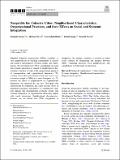Files in this item
Nonprofits for cohesive cities : neighborhood characteristics, organizational practices, and their effects on social and systemic integration
Item metadata
| dc.contributor.author | Karner, Dominik | |
| dc.contributor.author | Meyer, Michael | |
| dc.contributor.author | Schmidthuber, Lisa | |
| dc.contributor.author | Semper, Daniel | |
| dc.contributor.author | Laryea, Krystal | |
| dc.date.accessioned | 2023-07-19T15:30:12Z | |
| dc.date.available | 2023-07-19T15:30:12Z | |
| dc.date.issued | 2023-05-05 | |
| dc.identifier | 290733135 | |
| dc.identifier | 21bfe353-6dfa-4baa-bd07-156279946a1e | |
| dc.identifier | 85158144190 | |
| dc.identifier.citation | Karner , D , Meyer , M , Schmidthuber , L , Semper , D & Laryea , K 2023 , ' Nonprofits for cohesive cities : neighborhood characteristics, organizational practices, and their effects on social and systemic integration ' , Voluntas: International Journal of Voluntary and Nonprofit Organizations . https://doi.org/10.1007/s11266-023-00571-1 | en |
| dc.identifier.issn | 0957-8765 | |
| dc.identifier.other | ORCID: /0000-0002-1593-7192/work/139157264 | |
| dc.identifier.uri | https://hdl.handle.net/10023/27991 | |
| dc.description | Funding: Open access funding provided by Vienna University of Economics and Business (WU). | en |
| dc.description.abstract | Nonprofit organizations (NPOs) contribute to vital neighborhoods by building communities of citizens and acting as intermediaries between citizens and organizations. We investigate how NPOs’ engagement in social and systemic integration is shaped by neighborhood characteristics, and how it relates to the organizational practices of managerialism and organizational democracy. We combine survey data with administrative data from a representative sample of NPOs in a major European city. To measure the effect of neighborhood on organizational integration, we separated the city into 7,840 grid cells characterized by population, per capita income, share of immigrant population, and density of organizations. Findings indicate that managerialism positively relates with systemic integration, as organizational democracy relates with social integration. Neighborhood characteristics, however, are not related with NPOs’ engagement in integration. Our findings contribute to research on urban social cohesion by illuminating the interplay between NPOs’ organizing practices, local neighborhoods, and contributions to both forms of integration. | |
| dc.format.extent | 12 | |
| dc.format.extent | 4927385 | |
| dc.language.iso | eng | |
| dc.relation.ispartof | Voluntas: International Journal of Voluntary and Nonprofit Organizations | en |
| dc.subject | Nonprofit organizations | en |
| dc.subject | Urban cohesion | en |
| dc.subject | Systemic integration | en |
| dc.subject | Neighborhood characteristics | en |
| dc.subject | Organizational practices | en |
| dc.subject | HM Sociology | en |
| dc.subject | E-NDAS | en |
| dc.subject | SDG 10 - Reduced Inequalities | en |
| dc.subject | SDG 16 - Peace, Justice and Strong Institutions | en |
| dc.subject.lcc | HM | en |
| dc.title | Nonprofits for cohesive cities : neighborhood characteristics, organizational practices, and their effects on social and systemic integration | en |
| dc.type | Journal article | en |
| dc.contributor.institution | University of St Andrews. School of Management | en |
| dc.identifier.doi | https://doi.org/10.1007/s11266-023-00571-1 | |
| dc.description.status | Peer reviewed | en |
This item appears in the following Collection(s)
Items in the St Andrews Research Repository are protected by copyright, with all rights reserved, unless otherwise indicated.

